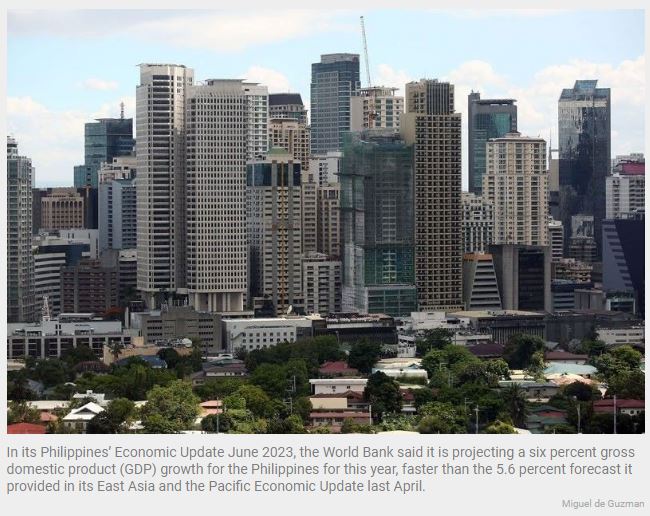World Bank hikes Philippine 2023 growth forecast to 6%
MANILA, Philippines — The World Bank has upgraded its 2023 growth forecast for the Philippines as it expects resilient domestic demand to drive growth, despite high inflation.
In its Philippines’ Economic Update June 2023, the World Bank said it is projecting a six percent gross domestic product (GDP) growth for the Philippines for this year, faster than the 5.6 percent forecast it provided in its East Asia and the Pacific Economic Update last April.
Despite the upward revision to the GDP forecast, the World Bank expects the Philippines to grow at a slower pace this year than last year’s 7.6 percent growth.
The World Bank’s revised GDP forecast is at the low end of the government’s six to seven percent growth target.
For next year and 2025, the World Bank expects the economy to grow by 5.9 percent annually.
World Bank senior economist Ralph Van Doorn said in a virtual briefing yesterday, the revised GDP forecast for the Philippines for this year reflects the resilient domestic demand seen in the first quarter.
The Philippine economy grew by 6.4 percent in the first quarter.
Van Doorn said strong domestic demand would drive the country’s economic growth this year, despite weak global conditions.
“We expect that consumption growth will be supported by improved employment, steady remittances and better consumer sentiment and also the expected decline in headline inflation,” he said.
The World Bank expects headline inflation in the country to average 5.7 percent and remain above the Bangko Sentral ng Pilipinas’ two to four percent target this year, before easing to 3.6 percent next year and three percent in 2025.
Inflation eased for the fourth straight month to 6.1 percent in May, due to slower transport and food price upticks, bringing the average for the January to May period to 7.5 percent.
“Headline inflation is projected to remain above target in 2023 as food prices remain elevated and as robust demand fuels underlying price pressures,” the World Bank said.
Aside from consumption, the World Bank expects services to continue to drive growth amid China’s reopening and the recovery of international tourism, as well as the decision of foreign companies to outsource their business operations to the Philippines to reduce costs.
Recently passed reforms allowing greater foreign participation in the economy, such as the amendments to the Public Service Act, Foreign Investment Act and Retail Trade Liberalization law are expected to encourage foreign investments into the country and support growth in the medium-term.
Van Doorn said there are downside risks to the country’s growth, however, which include higher-than-expected global inflation, tighter global financing conditions and an escalation of geopolitical tensions that could disrupt global activity and lead to sharper-than-expected global slowdown.
“Domestically, a key risk will be the threat of El Niño and supply chain bottlenecks, which could yet again raise food supply challenges and place upward price pressure on food prices,” he said.
Given persistent global and domestic risks that can hinder recovery and poverty reduction, World Bank country director for Brunei, Malaysia, Philippines, and Thailand Ndiamé Diop said “it is essential to sustain improvements in social protection to help families, especially the poor and vulnerable, cope with economic difficulties as the country navigates the global slowdown, budget constraints, high prices of basic commodities and climate-related risks.”
Van Doorn said addressing inflation would require measures such as reducing tariff and non-tariff barriers, enhancing domestic supplies, and bolstering agriculture with extension services, seeds and fertilizers.
According to the World Bank, investments in climate change initiatives, particularly in the agriculture sector, will also be beneficial.
To strengthen economic recovery and achieve long-term growth, Van Doorn said there is a need to promote investments through the implementation of recently approved investment reforms.
He also said the shift to low and zero-carbon alternatives would help address energy demand and improve energy security to support long-term growth.
Source: https://www.philstar.com/business/2023/06/08/2272184/world-bank-hikes-philippine-2023-growth-forecast-6


 Thailand
Thailand




